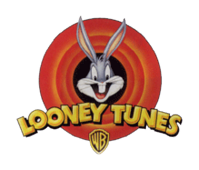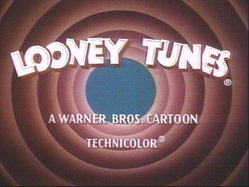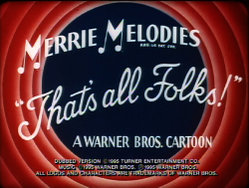Looney Tunes
Looney Tunes is a Warner Brothers animated cartoon series that preceded the Merrie Melodies series, and is both WB's first animated theatrical series and the second longest continuous animated series in any medium. more...
The regular Warner Bros. animation cast also became known as the "Looney Tunes" (often misspelled, intentionally or not, as "Looney Toons").
History
The two series were given two separate names because originally, Warner Bros. wanted them to be two separate cartoons series (in the same manner that Walt Disney's Silly Symphonies were separate from the Mickey Mouse series).
In the beginning years, both Looney Tunes and Merrie Melodies drew their storylines from Warner's vast music library. However, eventually the two series distinguished themselves by Looney Tunes becoming the umbrella for the studio's various recurring characters, while Merrie Melodies continued with the use of one-shot characters. Also, from 1934 to 1943 Merrie Melodies were produced in color and Looney Tunes in black and white; after 1943, however, both series were produced in color; the only real difference between the two series was in the variation between the opening theme music and titles. Both series by this time also made use of the various Warner Bros. cartoon stars. By 1943, the theme music for Looney Tunes was "The Merry-Go-Round Broke Down" by Cliff Friend and Dave Franklin; the theme music for Merrie Melodies was an adaptation of "Merrily We Roll Along" by Charles Tobias, Murray Mencher & Eddie Cantor. The reason for the Looney Tunes changeover to color was Warner Bros' decision to re-release only the color Merrie Melodies for their Blue Ribbon Classics series of cartoons, noted by the special "Blue Ribbon" title card.
Bosko was Looney Tunes' first major star, debuting in the short Sinking In the Bathtub in 1930. After several years and a move to rival studio MGM in an entirely different incarnation, Buddy took his place as the studio's main star. 1935 saw the debut of the first truly major Looney Tunes star, Porky Pig, after which followed the debuts of other memorable Looney Tunes stars such as Daffy Duck (in 1937) and the most famous of the Looney Tunes cast, Bugs Bunny (in 1940). Bugs appeared originally in the color Merrie Melodies and formally joined the Looney Tunes crew when it switched to color. Bugs' only appearance in a black & white Looney Tune was a gag appearance at the end of the Frank Tashlin 1943 cartoon Porky Pig's Feat.
While the early thirties cartoons never directly catered to a younger audience, the cartoons consisted mostly of musical singing/dancing and generally contained a sense of innocence (mostly as a result of imitating the Disney style). By the late thirties, the series had become edgier, and was more obviously targeted to the adult moviegoers of the time.
The Looney Tunes series' popularity was strengthened even more when the shorts began airing on network and syndicated television in the mid-to-late 1950s under various titles and formats. However, since the syndicated shorts' target audience was children and because of concerns over children's television in the 1970s, the Looney Tunes shorts began to be edited to remove scenes featuring innuendos, ethnic stereotypes and extreme violence.
The original Looney Tunes theatrical series ran from 1930 to 1969 (the last short being Injun Trouble, starring Cool Cat). During part of the 1960s the shorts were produced by DePatie-Freleng Enterprises after Warner Bros shut down their animation studios. The shorts from this era can be identified by the fact that they open with a different title sequence and a re-arranged version of "The Merry-Go-Round Broke Down," performed by William Lava. Theatrical animated shorts then went dormant until 1987 when new shorts were made to introduce Looney Tunes to a new generation of audiences. New shorts have been produced and released sporadically for theaters since then, usually as promotional tie-ins with various family movies produced by Warner Bros.
In 1989, Nickelodeon aired all the unaired cartoons in a Looney Tunes show called Looney Tunes On Nickelodeon until 1999 when it was removed off the network for Cartoon Network
In 1996, Space Jam, a feature film mixing animation and live action, was released starring Bugs Bunny and basketball player Michael Jordan. The movie was somewhat successful, and it introduced a new character named Lola Bunny.
In 2003, another feature film was released in an attempt to recapture the spirit of the original shorts, the live action/animated Looney Tunes: Back In Action. The film was a box-office disappointment, thus putting the theatrical future of Bugs and company in limbo.
There was a video game with the same name that came out on Game Boy and Game Boy Color.
The Looney Tunes characters have had more success in the area of television, with appearances in several originally produced series, including The Sylvester and Tweety Mysteries (starring Sylvester the cat, Tweety Bird and Granny), Taz-Mania (starring the Tasmanian Devil), Duck Dodgers (starring Daffy Duck and Porky Pig), and 2002's Baby Looney Tunes, which had a similar premise to Muppet Babies. The Looney Tunes characters also made frequent cameos in the 1990 series Tiny Toon Adventures, where they played teachers and mentors to a younger generation of cartoon characters. Upcoming is Loonatics Unleashed, a futuristic version of the characters.
Thanks to continued television airings, revival theatrical screenings, and the Golden Collection DVD box sets, the Looney Tunes and its characters have remained a part of Western animation heritage, and an American comedy institution.
Controversy
A handful of Looney Tunes shorts from the World War II era are no longer aired on American television nor are available for sale by Warner Bros. due to the racial stereotypes of African-Americans, Germans, Italians, Japanese, and Jews included in some of the cartoons (ironically, a significant number of the artists, executives, and producers of these cartoons were Jewish). Eleven cartoons were withdrawn from distribution in 1968 and are known as the Censored 11. This has caused dismay among some animation enthusiasts, however, who feel that they should have access to these shorts. There has been some success in returning these cartoons to the public; in 1999 all Speedy Gonzalez cartoons were made unavailable because of its alleged stereotyping of Mexicans. But because the level of stereotyping was minor compared to the World War II era cartoons mentioned above as well as the protests of many Hispanics who said they were not offended and fondly remembered Speedy cartoons from their youth, these shorts were made available for broadcast again in 2002. The release of the Looney Tunes Golden Collection: Volume 3 includes a disclaimer at the beginning of each DVD in the volume given by Whoopi Goldberg which explains that the cartoons in the collection are uncut and uncensored and contain scenes which may be considered unacceptable today.
Read more at Wikipedia.org




